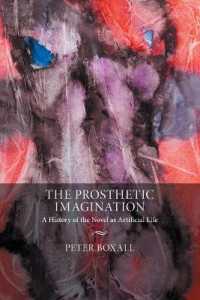- ホーム
- > 洋書
- > 英文書
- > Religion / Ethics
Full Description
Vishwa Adluri and Joydeep Bagchee undertake a careful and rigorous hermeneutical approach to nearly two centuries of German philological scholarship on the Mahabharata and the Bhagavad Gita. Analyzing the intellectual contexts of this scholarship, beginning with theological debates that centered on Martin Luther's solefidian doctrine and proceeding to scientific positivism via analyses of disenchantment (Entzauberung), German Romanticism, pantheism (Pantheismusstreit), and historicism, they show how each of these movements progressively shaped German philology's encounter with the Indian epic. They demonstrate that, from the mid-nineteenth century on, this scholarship contributed to the construction of a supposed "Indo-Germanic" past, which Germans shared racially with the Mahabharata's warriors. Building on nationalist yearnings and ongoing Counter-Reformation anxieties, scholars developed the premise of Aryan continuity and supported it by a "Brahmanical hypothesis," according to which supposedly later strata of the text represented the corrupting work of scheming Brahmin priests.
Adluri and Bagchee focus on the work of four Mahabharata scholars and eight scholars of the Bhagavad Gita, all of whom were invested in the idea that the text-critical task of philology as a scientific method was to identify a text's strata and interpolations so that, by displaying what had accumulated over time, one could recover what remained of an original or authentic core. The authors show that the construction of pseudo-histories for the stages through which the Mahabharata had supposedly passed provided German scholars with models for two things: 1) a convenient pseudo-history of Hinduism and Indian religions more generally; and 2) a platform from which to say whatever they wanted to about the origins, development, and corruption of the Mahabharata text. The book thus challenges contemporary scholars to recognize that the ''Brahmanic hypothesis'' (the thesis that Brahmanic religion corrupted an original, pure and heroic Aryan ethical and epical worldview), an unacknowledged tenet of much Western scholarship to this day, was not and probably no longer can be an innocuous thesis. The ''corrupting'' impact of Brahmanical ''priestcraft,'' the authors show, served German Indology as a cover under which to disparage Catholics, Jews, and other ''Semites.''
Contents
Introduction ; A History of German Indology ; The History of German Indology as a History of Method ; The Origins of the Historical-Critical Method in Neo-Protestantism of the 18th Century ; The Origins of Philology in the Argument for the Immortality of the Soul ; Defining the Scope of Inquiry ; Plan of Study ; Chapter 1: Historical Identity and Narrative Constructs in an Indo-Germanic Setting ; The Birth of German Mahabharata Studies ; The Indo-Germanic Original Epic: ; The Buddhist Poetic Composition ; Buddhism and Protestantism ; Protestantism, the Counter-Reformation, and the Prosecution of Heresy ; The Twin Brahmanic Redactions ; Brahmanism and Catholicism ; Return to the Problem of Textual Reconstruction ; Chapter 2: Text-Historical Reconstruction and the Struggle for an Objective Canon ; The Bhagavad Gita in German Indology ; The Theistic Gita: Richard Garbe ; The Epic Gita: Hermann Jacobi ; A Practical Gita: Hermann Oldenberg ; The Trinitarian Gita: Rudolf Otto ; The Soldier's Gita: Theodor Springmann ; The Aryan Gita: Jakob Wilhelm Hauer ; The Brahmanic Gita: Georg von Simson ; What is the German Gita?: A Review ; Chapter 3: German Indology in the Context of the European Geisteswissenschaften ; Problems with the Critical Method ; The Scientification of Protestant Theology in the Critical Method ; The Secularization of Protestant Theology in the Study of the History of Religions ; The Institutionalization of Protestant Theology in Indology ; Three Notions of Science: Positivism, Historicism, and Empiricism ; Criticisms of the Positivistic Notion of Truth ; From Historicism to Hermeneutics ; Conclusion ; Writing under Erasure ; Creating the Object of Scientific Research ; Honest Heretics or Neo-Brahmins? ; Afterword: Gandhi on the Gita Problem ; Notes ; Bibliography ; Index








